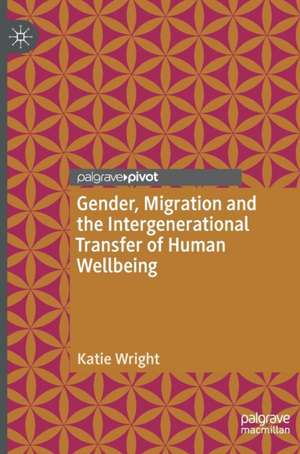Gender, Migration and the Intergenerational Transfer of Human Wellbeing
Autor Katie Wrighten Limba Engleză Hardback – 5 dec 2018
Preț: 384.70 lei
Nou
Puncte Express: 577
Preț estimativ în valută:
73.61€ • 77.06$ • 60.91£
73.61€ • 77.06$ • 60.91£
Carte tipărită la comandă
Livrare economică 07-21 aprilie
Preluare comenzi: 021 569.72.76
Specificații
ISBN-13: 9783030025250
ISBN-10: 303002525X
Pagini: 147
Ilustrații: IX, 141 p.
Dimensiuni: 148 x 210 mm
Greutate: 0.34 kg
Ediția:1st ed. 2018
Editura: Springer International Publishing
Colecția Palgrave Pivot
Locul publicării:Cham, Switzerland
ISBN-10: 303002525X
Pagini: 147
Ilustrații: IX, 141 p.
Dimensiuni: 148 x 210 mm
Greutate: 0.34 kg
Ediția:1st ed. 2018
Editura: Springer International Publishing
Colecția Palgrave Pivot
Locul publicării:Cham, Switzerland
Cuprins
1: Introduction.- 2: Intergenerational Transfers over the Life Course: Addressing Gendered and Temporal Complexities.- 3: Intergenerational Transfers, Migration and Human Wellbeing.- 4: Contextualising Intergenerational Transmission and Human Wellbeing in London.- 5: Intergenerational Transmission and Human Wellbeing: Latin American Migrant Women and their Daughters in London.- 6: Intergenerational Relations and Gendered Transmissions: Conflicts, Reparations and Solidarities.- 7: Conclusions and Implications for Theory and Policy.
Recenzii
“Wright’s study offers implications for both theory and public policy. … Katie Wright’s study is undoubtedly important, but its empirical findings, in my view, are even more interesting and richer than the conclusion drawn from them in the book.” (Judith Kausch-Zongo, Intergenerational Justice Review, Vol. 7 (1), 2021)
Notă biografică
Katie Wright is Reader in International Development at the University of East London, UK. Her research focuses on gender, human wellbeing, international migration, microfinance, sustainable livelihoods and Latin America. Her previous monograph, International Migration, Development, Human Wellbeing and International Migration (2012) drew on Economic and Social Research Council funded work in this area.
Textul de pe ultima copertă
This book discusses how human wellbeing is constructed and transferred intergenerationally in the context of international migration. Research on intergenerational transmission (IGT) has tended to focus on material asset transfers prompting calls to balance material asset analysis with that of psychosocial assets – including norms, values attitudes and behaviors. Drawing on empirical research undertaken with Latin American migrants in London, Katie Wright sets out to redress the balance by examining how far psychosocial transfers may be used as a buffer to mediate the material deprivations that migrants face via adoption of a gender, life course and human wellbeing perspective.
Katie Wright is Reader in International Development at the University of East London, UK. Her research focuses on gender, human wellbeing, international migration, microfinance, sustainable livelihoods and Latin America. Her previous monograph, International Migration, Development, Human Wellbeing and International Migration (2012) drew on Economic and Social Research Council funded work in this area.
Katie Wright is Reader in International Development at the University of East London, UK. Her research focuses on gender, human wellbeing, international migration, microfinance, sustainable livelihoods and Latin America. Her previous monograph, International Migration, Development, Human Wellbeing and International Migration (2012) drew on Economic and Social Research Council funded work in this area.
Caracteristici
Contributes to an emerging body of work on intergenerational transfers of human wellbeing in the context of migration Highlights the gendered processes through which such transfers occur Provides a longer term view by utilising intergenerational chains as the unit of analysis Illustrates how a fusion of gender, life course and human wellbeing perspectives can enhance policy outcomes
